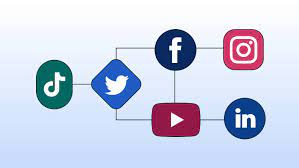

When is the last time you’ve walked into a restaurant and saw an entire table of friends on their phone, each content to be in their own world - nearly unaware of the reality around them? With the meteoric rise in popularity for documentaries like The Social Dilemma, it safe to say that questioning the effect that social media addiction has on our society a growing sentiment and realization within today’s culture. With many people decided to take a social media detox, or quit social media all together. But what is the path forward in the new age of social media, and the side effects of the rapid evolution of the technology and the algorithms that control how we interact with the platform? Is it as simple as turning off big tech, or perhaps to quit social media? Or is there a way we can start to take control our use to find a healthy balance for social media and mental health?
I want you to start looking for something and I promise you once you start looking for it. You'll never be able to stop seeing it everywhere you go.
When's the last time you've walked into a restaurant and saw an entire table of friends on their phone or a group of people on the street or maybe even your family in the morning, each content to be in their own world, nearly unaware of the reality around them. If the majority of human interaction is non-verbal, what would happen if you removed everything but that small remainder for over a decade? As it turns out, that's the very experiment that we're living in today. I remember when I was growing up way back in the day, a prehistoric time before everyone had a cell phone and computers were named after the year they were made in OK. I'm not quite a dinosaur yet, but I grew up in a unique time where half of my childhood was without the major technology and platforms that seemed to rule parts of our lives today, and the other half of my childhood was rapidly slingshot into the new age of technology. I remember from the earlier half of my childhood, life seemed different.
Especially human interaction. If you wanted to talk with someone, you had no other option but to physically go out and find them and spend uninterrupted time with them in the same room. And while you were there, there was nothing pulling your attention away, nothing in the back of your mind reminding you that there are 100 of other people sharing information that you might be missing out on that degree of presence practiced day in and day out created a different richness to human interaction with intricacies and nuances that seems to be slowly and gradually lost. The further we progress into this new age of technological advancement and with the meteoric rise and popularity for documentaries like The Social Dilemma, it's safe to say that this is a growing sentiment and realization within today's culture. The terrifying crux to the problem is actually quite simple. There's a massive mismatch between the rate of adaptation and advancement between our biology and technology.
Because of the law of accelerating returns, the pace of advancement in information technology is exponential, and while technology continues to grow at a rapid pace, we're left still trying to figure out how it actually impacts us, especially when we're teaching algorithms to predict and modulate our behavior. I don't think that anyone's denying that social media as well as instant communication is extremely addictive and its addiction falls right within the same symptoms as substance abuse.
But what we don't quite know yet is how this addiction over time changes not only our behaviors through hacking our positive reinforcement centers of the brain, but how over time it changes our perception of reality itself. When we first embarked upon the social media experiment, we had far more in-person interactions under our belt than we did interactions online. So we took our in-person frame of reference and viewed all of our technological interactions through that lens. But now in a time when we have 100 even thousands of friends, acquaintances, celebrities, and online personalities that we keep up with online, we have slowly over time replaced the majority of our interactions with being digital. How much do we now view our in-person interactions through our new digital lens? As a prominent example, you can look at our glowingly polarized political discourse in modern times, and you see that we've already started to see the symptoms of a very binary interpretation of human interaction. It's also worrisome to think that our upcoming generation's digital presence may end up being more important than their in-person presence.
So how do we stop all of this from happening is the answer to shut it all down, just pull the plug on Big Tech. I don't think that it is, the truth is we've opened pandora's box, and this is the reality that we're now faced with. So what's the path forward? The first step is underway awareness. Much of classical conditioning, and if you don't know what that is, pavlov's dogs might ring a bell is based on the more non-conscious mechanisms of the brain. If you become conscious of how the conditioning is affecting you, it gives you a degree of control over your behavior.
Beyond that it's important to maintain that balance of in-person and digital interaction. You want the lens that you view the world from to be a full 100 percent of human communication, body language, emotion, facial expression, nuanced tonality. It's what we were designed to do and we can't let that practice atrophy because that's what creates our sense of identity and community that gives us a healthy view of others in the world. If we can maintain that balance, we can begin to have a healthier relationship with our online presence and retain control over the influence these platforms and technologies have on us. These algorithms are based on human behavior and response, and that's something we have control over. Take some small steps today, maybe start by uninstalling some social media platforms from your phone. Then you have to physically go log into your computer to use it, removing some of the convenience if you're tied to your phone for work. Once the day is done, find some time to spend with your family and friends and turn your phone completely off for it. Be fully present with the people that you're with and you just might notice that the world isn't quite as crazy as it seems and that the life right in front of you is beautiful.
